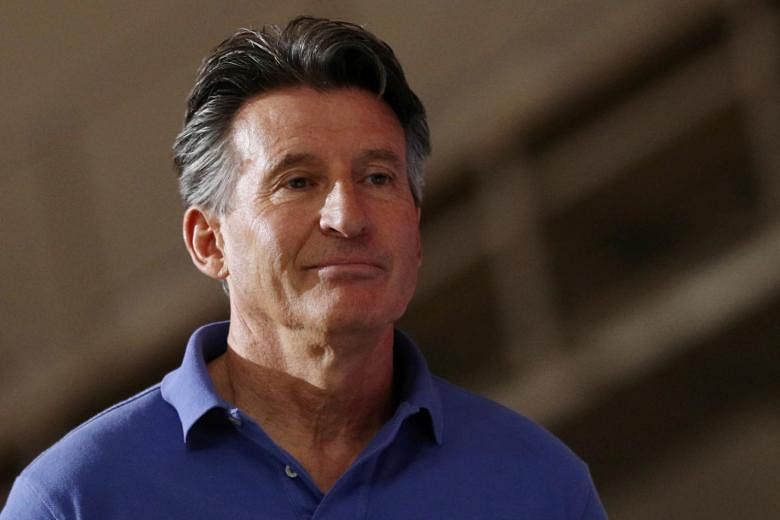SINGAPORE - In this turbulent coronavirus era, Sebastian Coe knows it would be foolhardy to guarantee anything, much less the staging of a global event as huge as the Olympic Games that has already been postponed from last year.
But the Briton, who leads the No. 1 Olympic sport, athletics, and is also a member of the International Olympic Committee (IOC), remains upbeat even as the IOC's leaders gather via video conference on Wednesday (Jan 27) for a key meeting on the Tokyo Games.
In an exclusive interview with The Straits Times on Monday (Jan 25), the World Athletics president pointed out that in his frequent conversations with various stakeholders such as athletes, the IOC, the Japanese government, the international federations, delivery partners and broadcasters, the feedback has been largely enthusiastic despite recent speculation that Tokyo 2020 may be cancelled.
He said: "The world is enthused by the concept, not just of an Olympic Games under normal circumstances, but an Olympic Games that can help people adjust from the challenges that we have all faced as communities.
"And if we can deliver the Games safely and securely, then I think every effort should be made to do that... I think sport is important in this regeneration.
"(If the Games is cancelled), the world will lose a massive moment for the uniting of humanity. Athletes will be hit hard... the ecosystem of Olympic sport depends on a successful Games culturally, economically, and psychologically."
But the 64-year-old, who chaired the organising committee chairman for London 2012, acknowledged the Herculean task ahead of the organisers.
He said: "There is no project management in the life of a city and its delivery partners, government and municipal agencies more challenging and complicated than the delivery of an Olympic Games... it is almost beyond compare."
THREE KEY CHALLENGES
Lord Coe cited three considerations that affect the complexion of an event that attracts over 11,000 athletes from more than 200 countries every four years.
The first is to create a safe and secure environment for participants without it being "claustrophobic". "Security is important but it can't be the defining image of a Games."
The second is a recognition that while the Games is staged in one city, it is being delivered to a global audience with of four or five billion people. Host nations must realise that they are "hosting the world and not just hosting your local communities".
Amidst all this, organisers must also remain athlete-centric, to give the stars of the show "the maximum opportunity to reach their full potential". But this, the two-time Olympic gold medallist noted, is perhaps the key to the running of a smooth Games: "If you get it right for the athletes, then you're going to get it right for most of the project management."
THE SPECTRE OF COVID
The additional challenge Covid-19 has provided this time has been immense, which is perhaps best illustrated by a 53-page "toolbox" of Covid-19 regulations and protocols dealing with aspects such as immigration and management of the duration of athletes' stay in the Games village or in the country.
"Everything is looked at, and that is important because there can be no taboos, there shouldn't be anything that we are not prepared to discuss publicly and transparently," said Lord Coe.
He acknowledged the inherent moral dilemma - the successful staging of the Olympics can be a celebration of resilience, but it can also be a public health and public relations disaster if an outbreak happens in the midst of the Games.
"We put two groups of people at the centre to make sure there is a safe and secure Games - obviously the athletes, but equally the people of Tokyo and Sapporo where many of (athletics') road racing events are going to take place," he said.
"We need to also consider their concerns about the world going to Japan, so we need to have our Covid protocols, our systems in place, that everybody recognises are very, very robust and we need to vigorously adhere to them.
"And I can say on behalf of World Athletics, we take this very seriously. So that I hope is something that will create and provide comfort for the people of Japan."
NOT THE SAME AS 2020
With much of the world still in the grips of the pandemic, and with the Japanese government implementing an emergency lockdown in 11 prefectures earlier this month due to another surge in cases, there has been a sense of deja vu about the discussions surrounding the fate of the Games.
But Lord Coe noted that "there are very distinct differences this time from where we were this time last year".
He pointed out that vaccines are being rolled out and the knowledge of the virus and its medical management have improved.
Twelve months ago, global sport ground to a sudden stop with athletes left in limbo, unable to train or compete with countries going into lockdowns and facilities closed. But many are now training and competing. World Athletics has held 36 events in the last six months for example.
While the IOC has said that it will not make vaccination compulsory for athletes and spectators should the Tokyo Olympics proceed, he personally hopes participants will get inoculated, and shared that the IOC is in talks with health agencies to help defray the costs of National Olympic Committees that are more in need.
Lord Coe said: "Sport does not want to be elbowing vulnerable communities, elderly people, frontline workers, and health care emergency services out of the way to get the vaccine, and I don't believe athletes want that either.
"I'm never very comfortable about mandating people to do very much... So, there is a balance here, but my personal instinct is it is much better to allow this uptake to take place without forcing people to do it."
A CHALLENGE, NOT A CRISIS
While he described Covid-19 as the biggest challenge that sports has confronted, he refused to look at it as a crisis, but more of a "profound period of change".
He felt that the organisations that will emerge from the pandemic in good shape are those operating at two speeds - the first is dealing with Covid-19, the common enemy, and how to keep athletes training and competing; and the second is making sure they do not take their eyes off the ball for the other things that need to be done.
He cited the example of what World Athletics has been doing since the arrival of Covid.
He said: "(For World Athletics), the last six months have been very important. We still delivered a strategic plan, that is the roadmap for our sport internally for the next four years.
"We have looked at many of the other issues we have been dealing with around Russia and DSD (differences of sex development), around the ability of our sports teams to look at new formats, and things that will keep our sport salient and exciting in the lives of young people.
"There are some very important pillars particularly around gender leadership, continuing to encourage more women into our sport both in the field of play and in our governance structures.
"We are still pushing ahead on all those fronts and that's why I think World Athletics has come through this relatively well. Nobody has come through unscathed, but that is the challenge."


